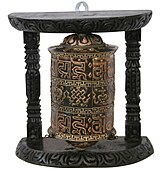| Part of a series on |
| Spirituality |
|---|
| Outline |
| Influences |
| Research |
Karma (/ˈkɑːrmə/, from Sanskrit: कर्म, IPA: [ˈkɐɾmɐ] ; Pali: kamma) is an ancient Indian concept that refers to an action, work, or deed, and its effect or consequences.[1] In Indian religions, the term more specifically refers to a principle of cause and effect, often descriptively called the principle of karma, wherein individuals' intent and actions (cause) influence their future (effect):[2] Good intent and good deeds contribute to good karma and happier rebirths, while bad intent and bad deeds contribute to bad karma and worse rebirths. In some scriptures, however, there is no link between rebirth and karma.[3][4] Karma is often misunderstood as fate, destiny, or predetermination.[5]
The concept of karma is closely associated with the idea of rebirth in many schools of Indian religions (particularly in Hinduism, Buddhism, Jainism, and Sikhism),[6] as well as Taoism.[7] In these schools, karma in the present affects one's future in the current life as well as the nature and quality of future lives—one's saṃsāra.[8][9] This concept has also been adopted in Western popular culture, in which the events that happen after a person's actions may be considered natural consequences of those actions.
- ^ See:
- Encyclopædia Britannica, 11th Edition, Volume 15, New York, pp 679–680, Article on Karma; Quote – "Karma meaning deed or action; in addition, it also has philosophical and technical meaning, denoting a person's deeds as determining his future lot."
- The Encyclopedia of World Religions, Robert Ellwood & Gregory Alles, ISBN 978-0-8160-6141-9, pp 253; Quote – "Karma: Sanskrit word meaning action and the consequences of action."
- Hans Torwesten (1994), Vedanta: Heart of Hinduism, ISBN 978-0-8021-3262-8, Grove Press New York, pp 97; Quote – "In the Vedas the word karma (work, deed or action, and its resulting effect) referred mainly to..."
- ^ Olivelle, Patrick (2012). "Karma". Encyclopædia Britannica. Archived from the original on 3 May 2015. Retrieved 23 June 2022.
- ^ Halbfass, Wilhelm (2000). Karma und Wiedergeburt im indischen Denken (in German). Munich, Germany: Diederichs. ISBN 978-3-89631-385-0.
- ^ Lawrence C. Becker & Charlotte B. Becker, Encyclopedia of Ethics, 2nd edition (2001), ISBN 0-415-93672-1, Hindu Ethics, pp 678
- ^ Wasserman, Danuta (8 January 2021). Oxford Textbook of Suicidology and Suicide Prevention. Oxford University Press. ISBN 978-0-19-883444-1.
- ^ Parvesh Singla. The Manual of Life – Karma. Parvesh singla. pp. 5–7. GGKEY:0XFSARN29ZZ. Retrieved 4 June 2011.
- ^ Eva Wong, Taoism, Shambhala Publications, ISBN 978-1-59030-882-0, pp. 193
- ^ Cite error: The named reference
jbowkerwas invoked but never defined (see the help page). - ^ Cite error: The named reference
jameslochwas invoked but never defined (see the help page).

